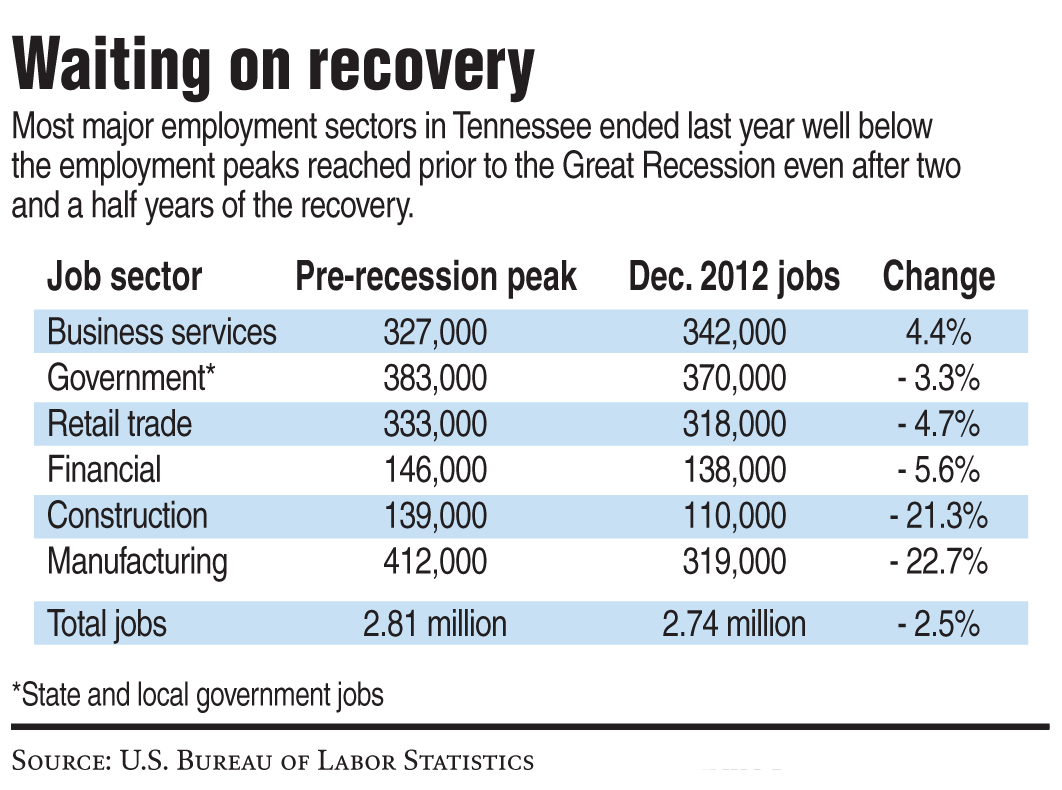Tennessee continues to climb out of the economic hole dug during the Great Recession, but employment in many sectors of the state's economy may remain below pre-recession levels for another decade.
Overall employment in Tennessee is projected to return to its pre-recession peaks in another couple of years, but a new study suggests it will be 2022 until the number of retail, financial and information jobs returns to the 2007 peak levels reached before the recent economic downturn. Construction employment won't get back to precession-levels until 2019, and manufacturing may never recover all of the jobs lost during the 2008-2010 downturn.
"The expectation for recovery in some sectors in Tennessee remains dismal," said Dr. Stan Chervan, senior research consultant for the Tennessee Advisory Commission on Intergovernmental Relations who authored a new study on the state's "Long Road Back to Normal." "Almost six years after the recession began, employment has yet to fully recover."
Tennessee shed 220,000 jobs among 8.7 million jobs lost nationwide during the 2008-2010 recession, Chervan said. At the end of last year -- two and a half years after the Great Recession officially ended -- Tennessee had regained only about two-thirds of the jobs lost in the recession.
The Volunteer State has added more than 150,000 jobs in the past three years, and economists at the University of Tennessee expect employment to bounce back even stronger in 2014 and 2015 than in the current year.
"The economy has finally found a firm footing," said Dr. Matt Murray, associate director at UT's Center for Business and Economic Research and author of a new economic forecast for Tennessee. "This will be the third year of payroll employment growth and a falling unemployment rate following the Great Recession."
But higher home and car sales this year still aren't enough yet to completely offset the economic blow from the recent recession, Murray said.
"The recession was deeper than any other post-World War II recession so it will take longer to get back to where we were," he said. "We were slow to grow after the end of the recession in summer of 2009 because of the lingering problems, including the financial and housing market messes."
The Chattanooga region is being buoyed this year by staff increases from Engineered Floors adding 2,400 jobs in North Georgia, Convergys adding 500 jobs in Chattanooga, Global Green Lighting adding 250 jobs in Hixson and Goodman Manufacturing adding 200 jobs in Dayton, Tenn.
But cutbacks by Volkswagen and its suppliers, combined with payroll tax increases and federal sequestration budget cuts, have offset some of those gains.
"We're seeing a bit of a lull in Chattanooga after previous job additions at Volkswagen really helped the local employment market," said Mark Campbell, owner of the local Manpower franchise which has worked with several VW suppliers hurt by the recent cutoff of VW's third shift in Chattanooga.
Spring Forecast
In his spring economic outlook, Murray projects that Tennessee's jobless rate will fall from 8 percent last year to 7.8 percent this year and to 7.5 percent next year. But Tennessee's jobless rate is still expected to stay above the U.S. average.
The employment gains this year and next are only about half the pace of most economic recoveries in the post-World War II era, Murray said.
"Our manufacturing sector had a quicker and more significant rebound than the nation, and that has been a major source of our stronger growth [in 2011 and 2012]," Murray said.
But so far this year, Tennessee's jobless rate has eased above the U.S. average and is likely to stay a bit higher than the national rate, in part, because of faster growth in the number of workers looking for jobs, Murray said.
"The good news is that unemployment rates for the state and nation are expected to trend down together over the next couple of years," he said.
Contact Dave Flessner at dflessner@timesfreepress.com or at 757-6340

